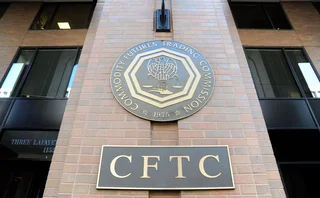Max Bowie: This Valentine’s Day, Why Not … Break Up?

OK, so Waters isn’t the National Enquirer. But we can still run with a few breakup scandals now and then. Of course, our salacious headlines aren’t about the Kardashians or Brangelina, but are more along the lines of Dow Jones CEO Lex Fenwick, who—on his almost two-year anniversary at the company—abruptly divorced himself from the grand heiress of financial news, after giving the old girl a facelift modeled on Bloomberg when he was CEO there.
Breakups can be hardest on the kids—or, in this metaphor, Dow Jones staff—though the Dow Jones union described the departure with thinly disguised glee.
Other ongoing splits are also prompting gleeful responses: The US Securities and Exchange Commission (SEC) is divorcing credit ratings from SEC rules, in accordance with the Dodd–Frank Act. This move—part of a broader removal of references to credit ratings in SEC documents—eliminates reliance on nationally recognized statistical rating organizations (NRSROs) from processes governing credit quality assessment and reporting, capital adequacy, account segregation, and terms and conditions notifications. The significance of this—and the broader removal of reliance on credit ratings under Dodd–Frank—is that the investment industry’s decisions are no longer dictated by ratings that the credit crisis exposed as flawed.
“The NRSROs failed miserably in their ratings of asset-backed securities, especially residential mortgage-backed securities, in the years leading up to the crisis. These faulty ratings were a core cause of the financial crisis, and the incorporation of references to credit ratings into Commission rules … exacerbated the problem,” said commissioner Daniel Gallagher, commending the changes.
Regulatory Pressure
With everyone still focused on New Year’s resolutions and turning over a new leaf, regulators and authorities are making it clear that if they don’t like what’s lurking under those leaves, they’ll step in and stamp on it.
If consolidation continues, we may yet see a few strange bedfellows this year as disruptive companies forge alliances or get snapped up.
For example, New York attorney general Eric Schneiderman—who last year persuaded Thomson Reuters to suspend early access to its University of Michigan Consumer Sentiment Index survey data for high-frequency firms willing to pay more for a sneak peek at the results—has now engineered the breakup of asset manager BlackRock’s analyst survey program, which Schneiderman says gave an unfair advantage to technically sophisticated traders.
The program, originally developed by Barclays Global Investors for use by its Scientific Active Equities quantitative trading business, surveyed analysts on a monthly or quarterly basis for their opinions about specific companies in an effort to predict—or “front-run,” as the Schneiderman report quotes one BlackRock exec as saying—recommendation changes that the analysts would subsequently publish according to their own schedule. This allowed BlackRock to identify expected trends before the rest of the market, which would react to the analysts’ reports. Scheiderman’s move also breaks up a cozy relationship whereby participating analysts would receive higher ratings, moving them up in analyst rankings and potentially enabling them to command higher salaries.
Being a family-friendly magazine, we think this kind of back-scratching should only take place in the privacy of one’s bedroom between consenting adults. Speaking of which, network and datacenter hosting provider Savvis is finally consummating its 2011 marriage to US telecommunications provider CenturyLink, finally taking its partner’s name to become CenturyLink Technology Solutions (CTS). But, officials say, that’s all that changes. CTS will maintain its focus on providing hosting, co-location, cloud and managed services to the capital markets, while leveraging CenturyLink’s other network assets to win new business.
So, it’s not all about breakups. In fact, if consolidation continues, we may see a few strange bedfellows as disruptive companies forge alliances to gain scale, or get snapped up by larger vendors to boost their agility or to preserve their position. But choose your partners wisely, because breaking up isn’t always as easy as the CEO walking out.
Only users who have a paid subscription or are part of a corporate subscription are able to print or copy content.
To access these options, along with all other subscription benefits, please contact info@waterstechnology.com or view our subscription options here: http://subscriptions.waterstechnology.com/subscribe
You are currently unable to print this content. Please contact info@waterstechnology.com to find out more.
You are currently unable to copy this content. Please contact info@waterstechnology.com to find out more.
Copyright Infopro Digital Limited. All rights reserved.
As outlined in our terms and conditions, https://www.infopro-digital.com/terms-and-conditions/subscriptions/ (point 2.4), printing is limited to a single copy.
If you would like to purchase additional rights please email info@waterstechnology.com
Copyright Infopro Digital Limited. All rights reserved.
You may share this content using our article tools. As outlined in our terms and conditions, https://www.infopro-digital.com/terms-and-conditions/subscriptions/ (clause 2.4), an Authorised User may only make one copy of the materials for their own personal use. You must also comply with the restrictions in clause 2.5.
If you would like to purchase additional rights please email info@waterstechnology.com
More on Regulation
Regulators can’t dodge DOGE, but can they still get by?
The Waters Wrap: With Trump and DOGE nipping at regulators’ heels, what might become of the CAT, the FDTA, or vendor-operated SEFs?
CFTC takes red pen to swaps rules, but don’t call it a rollback
Lawyers and ex-regs say agency is fine-tuning and clarifying regulations, not eliminating them.
The European T+1 effect on Asia
T+1 is coming in Europe, and Asian firms should assess impacts and begin preparations now, says the DTCC’s Val Wotton.
FCA sets up shop in US, asset managers collab, M&A heats up, and more
The Waters Cooler: Nasdaq and Bruce ATS partner for overnight market data, Osttra gets sold to KKR, and the SEC takes on DOGE in this week’s news roundup.
Waters Wavelength Ep. 312: Jibber-jabber
Tony, Reb, and Nyela talk about tariffs (not really), journalism (sorta), and pop culture (mostly).
Experts say HKEX’s plan for T+1 in 2025 is ‘sensible’
The exchange will continue providing core post-trade processing through CCASS but will engage with market participants on the service’s future as HKEX rolls out new OCP features.
No, no, no, and no: Overnight trading fails in SIP votes
The CTA and UTP operating committees voted yesterday on proposals from US exchanges to expand their trading hours and could not reach unanimous consensus.
Big xyt exploring bid to provide EU equities CT
So far, only one group, a consortium of the major European exchanges, has formally kept its hat in the ring to provide Europe’s consolidated tape for equities.








